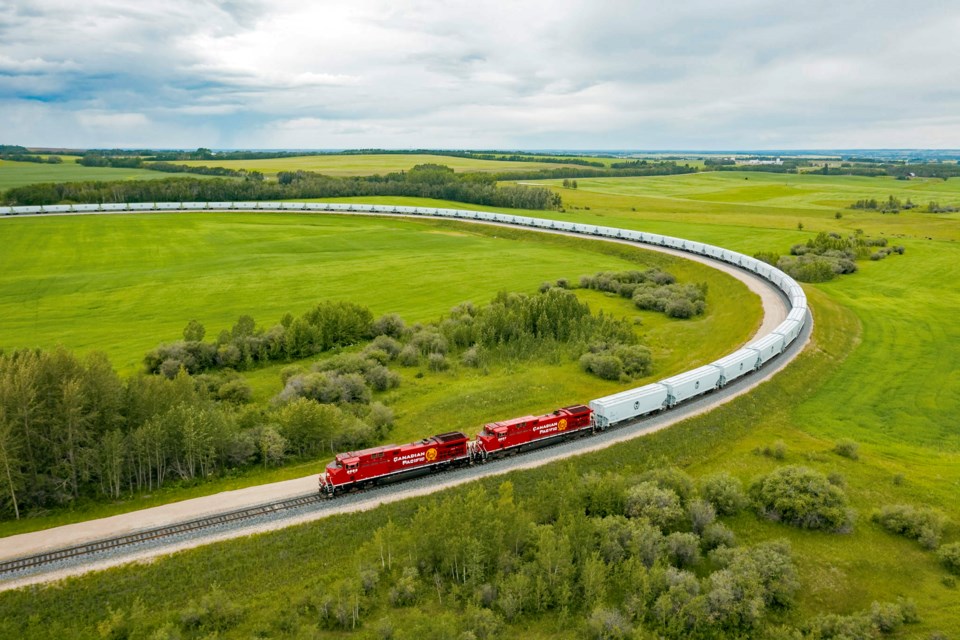There’s never a good time for service disruptions on the railway, but a looming dual work stoppage will have lasting effects on Canada’s agriculture sector as well as the cost of consumer goods, according to Alberta Grains.
The Canadian National Railway (CN) and the Canadian Pacific Kansas City (CPKC) are both in negotiations with the Teamsters Canada Rail Conference union, expected to result in a rail lockout on Thursday. The union has been demanding better wages and benefits for workers, as well as better crew scheduling.
CPKC announced embargoes for all shipments originating in Canada effective as of Aug. 20, which means stalled freight trains across Canada.
“On the wheat side, over 80 per cent of our crop is exported and is reliant on the railway,” said Shannon Sereda, Alberta Grains’ director of government relations, policy and markets.
Due to the conditions this growing season, crops matured a bit faster than normal, she said, and harvest is already underway.
“Because farmers are getting into the field and getting the crop off, the timing isn't great,” Sereda said, adding they’re hoping for a quick resolution. Even in the case of a quick resolution, the slightest service disruption will have a big impact. Due to the complexity of the rail system, even one day of work stoppage could create up to a week of backlog.
“For every day, it could take up to a week to restore service back to acceptable levels,” said Sereda.
“We've been advocating very early on to the government to intervene early and try to come and help the parties come to an agreement because we know that even a day or two of work stoppage can have reverberating effects across the entire supply chain.”
Labour Minister Steven MacKinnon will be in Calgary this week to help progress the negotiations. Sereda said they’re hopeful the minister will use all the tools available to intervene before the unprecedented dual work stoppage officially starts on Thursday.
“I just hope that the government's mindful of what even one or two days could do to the system as we move into harvest,” Sereda said. “But [also] for all industries and the broader economy.”
She added this work stoppage will affect everyone, not just the agriculture community and other industries, but also consumers will feel a significant impact.
“We saw it play out that way in the pandemic when we had supply chain disruptions,” Sereda said. “I think some of the inflation and the costs that consumers are dealing with now is still, part of that, just the supply chain sorting itself out after the pandemic.”
Most certainly, these kinds of disruptions start to have an impact as soon as the demand for goods goes up, she added, which effectively drives up the price.
“Just the complexity of the logistics systems and how integrated they are between countries, it’s very reverberating,” Sereda said. “It's not like this will only have an impact in Canada.”
A major concern for the industry is that they’ve been advocating for decades for more accountability and more reliability from the railways. Sereda noted they see interruptions almost on an annual basis for various reasons, and better policies are needed to protect against these disruptions.
Sereda explained that most grain elevators in Alberta are beholden to one railway, which requires robust policy to ensure reliability and service provision because the power currently lies in the hands of the railways.
If farmers can’t deliver their grain, and there is no holding capacity for the elevators due to rail cars not showing up or being deferred, their only option is to hold on to their product until it can be moved. Some farmers have the storage capacity on their farms, but if the work disruption is prolonged, then there would be major concerns about not only storage capacity but also what's happening with that grain.
“There's definitely costs that will flow through to the farmer,” Sereda said, including costs being passed down from the ships sitting at port unable to receive shipments.
In terms of alternate shipping options, Sereda noted trucking grain beyond 100 kilometres loses its value. She added maybe a handful of southern Alberta farmers along the United States border could truck their grain south, but it’s not an option for the rest of Alberta.
“Our international customers are watching and they're concerned,” Sereda added. “We've affected our reputation already in the past with work stoppages and we've worked hard as an industry to rebuild that. And so we just need to have reliability in the system to get our grain to market, to our customers who are expecting it on time as scheduled.”
Keep an eye out for more rail disruption impact stories to follow.



